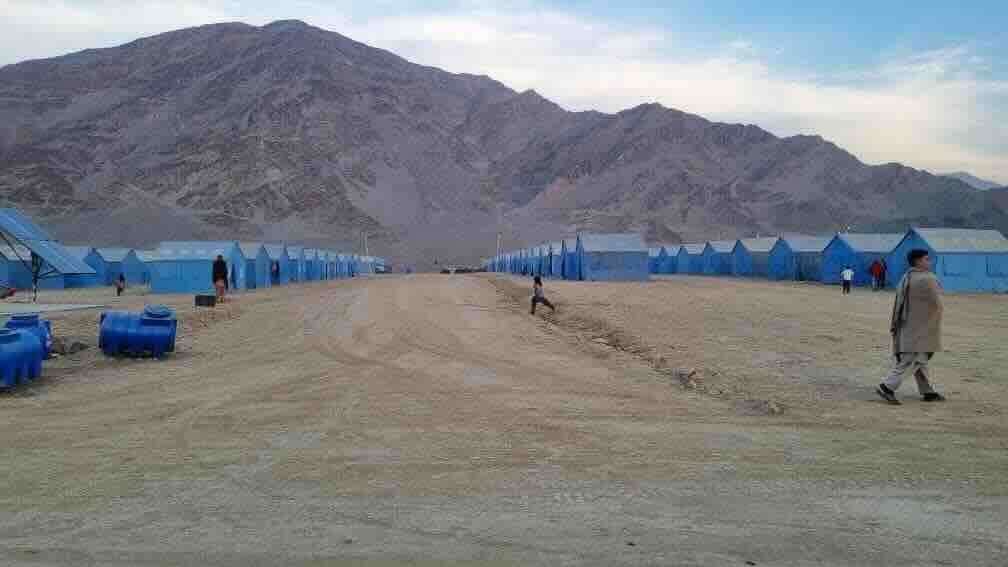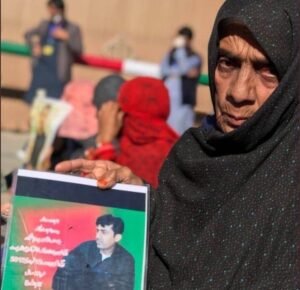Pakistan’s Callous Disregard for Afghan Refugees

Settlement for returnees from Pakistan on the outskirts of Nangarhar province, near the Durand Line. Photo by @Afghan for ADN.
By Shinwari
When the Taliban returned to power in August 2021, Islamabad hoped this would help Pakistan secure its western border. But this expectation was not met. Instead, there was a marked escalation in border tensions and terrorist attacks targeting Pakistan’s security forces.
While Pakistan accuses the Afghan Taliban of sheltering the outlawed Tehreek-i-Taliban Pakistan (TTP). The Afghan Taliban deny this and have instead urged Pakistan to look inward and address its own internal security challenges. The Afghan defense minister has alleged that ISKP (Islamic State-Khorasan Province) militants are operating from Pakistan to carry out attacks in Afghanistan.
Against this backdrop Pakistani authorities began to shift course and adopted a tougher policy. Islamabad intensified public criticism of Kabul, accusing it of harboring Pakistan’s enemies. All this showed that Islamabad was prepared to deploy several levers to pressure the Taliban. This also included the decision to deport tens of thousands of undocumented Afghans from Pakistan and substantial change in regulations governing transit trade by imposition of a ban on many import items, which led to thousands of stranded containers that were prevented from going to Afghanistan.
The Pakistan government’s decision to deport nearly half a million undocumented Afghans caused further fissures in the already strained relations between the two sides, prompting Kabul to accuse Islamabad of leveraging the refugees issue as pressure and coercive tool. According to a 2023 report of the United Nations High Commissioner for Refugees (UNHCR), 99 percent of the refugee population in Pakistan is Afghan, with approximately one-fourth, 700,000 out of 3.7m Afghans having crossed into Pakistan following the Taliban takeover of Kabul in 2021. After Pakistan announced its plan to enforce laws on illegal “aliens”, 500,000 undocumented Afghans have been forced to return to Afghanistan.
The Human Rights Commission of Pakistan’s (HRCP) annual report on the State of Human Rights in 2023, released on May 9, 2024 has castigated the Pak Govt for its policy towards Afghan refugees. The report stated that in the wake of the federal government’s decision to expel undocumented foreigners, Afghan nationals in particular were rounded up in police raids and sent to deportation centers with little to no legal recourse. HRCP is of the view that decision amounts to forced repatriation, which is not recognized under international law, and will invariably affect poor and vulnerable Afghan refugees and asylum seekers, including women, children, the elderly, persons with disabilities, and Afghans at risk because of their professions. Former senator and HRCP Council member Farhatullah Babar says that the absence of domestic laws on refugees is no excuse for failing to protect their rights, given Pakistan’s obligations under its tripartite agreement with Afghanistan and UNHCR.
In January 2024 JUI-F leader Maulana Fazlur led a nine-member delegation comprising party leaders from Khyber Pakhtunkhwa and Balochistan, to discuss regional and security issues. In a media release, the JUI-F leader had said he was confident to break the ice between the two sides and resolve issues.
Calling on the Pakistani authorities to end their “cruel attitude” towards Afghan refugees, Mullah Muhammad Hassan Akhund, the acting prime minister of the Afghan Taliban regime, told the delegation that such an attitude only exacerbated frustration and opposition. Mullah Akhund said the ‘Islamic Emirate of Afghanistan’ had no intention of causing harm to Pakistan or any other country for that matter, nor would it allow anyone to use the Afghan soil against any country.
For now, the treatment meted out to Afghan refugees and hurdles created by the Pakistani authorities in the transit trade and exports are causing huge losses to the Afghan traders.
Hundreds of thousands of Afghans had to hurriedly pack up their belongings to start fresh in their homeland, a place many of them had never seen before, in the months since the November 1, 2023 deadline. And months later, many have still not found their feet. The influx of returnees into Afghanistan from Pakistan came as the war-ravaged country grapples with economic, climate and humanitarian crises. The Taliban government, which took power almost three years ago, provides some support for the returnees but struggles to cope with the surge.
Further in Afghanistan, a harrowing truth persists: girls are denied the right to education, making it the only country in the world enforcing such a ban. The Pakistani government had adopted the policy of forced return for refugees to Afghanistan in violation of international law, protocols, and agreements. Although they were born in Pakistan to Afghan families, many girls deported to Taliban-controlled Afghanistan are not allowed to attend school and do not enjoy any rights.
Artists who are among those forced to return faced multiple threats in Afghanistan as the current Taliban regime was opposed to their profession. Months later, many Afghans forced out of Pakistan have still not found their feet. Mohammad and his family are living in a tent encampment in the Moye Mubarak area of Nangarhar with other recently returned Afghan families. He worked as a trainer at a sports club in Pakistan but is now jobless, unable to provide sufficient food for his family.[1]
Centre for Research and Security Studies (CRSS) Senior Coordinator Elsa Imdad Hussain believes that it is time for Pakistan to come up with a refugee law that should be both “human and gender-centric.”
Verso Consulting Islamabad Executive Director Safiya Aftab believes that the large-scale repatriation of Afghans from Pakistan in the given situation in Afghanistan was very heartless, particularly for girls.
The widespread departure of illegal “aliens”, spurred by the caretaker government’s abrupt decision to crack down and deport individuals lacking valid documents in Pakistan, could further contract the already fragile economies of Balochistan and Khyber Pakhtunkhwa as a vital source of cheap labor begins to dwindle. In April this year, a spokesperson for the Khyber Pakhtunkhwa government warned that Afghan nationals living legally in Pakistan should not be “harassed or expelled.” PTI leader’s statement came at a time when the government was implementing the second phase of the repatriation drive to send nearly one million ‘documented’ Afghans back to their homeland. Barrister Muhammad Ali Saif of the PTI warned that any action against legal Afghans would “foment hatred, misunderstanding and mistrust between us and Afghanistan”.
Pakistan’s former ambassador, Seema Ilahi Baloch, believes that Pakistan’s policy of allowing Afghan refugees was not necessarily in its national interest, but now it is wrong to forcefully deport them; rather, a policy on Afghan refugees should be made. She said, “We (Pakistan) need to be careful as neighbors but have to see the plight of Afghan women within the Pak-Afghan context, apart from the perspective of human and women’s rights.
International bodies, including the Amnesty International and United Nations Commissioner for the Rights of Refugees, have criticized, urging Pakistan to reconsider and reverse the decision to deport Afghan refugees.
Samira Hamidi, a campaigner for global human rights watchdog Amnesty International, questioned why Islamabad is going after Afghan refugees given the situation in Afghanistan. “Most of these refugees fled Afghanistan fearing persecution of the Taliban,” she wrote on X. “Such mapping and any further decision will expose them to great risk.”
The Pakistan authorities’ callous disregard for the persecution, serious human rights violations and humanitarian catastrophe that await Afghan refugees deported to Taliban-controlled Afghanistan is heart-breaking. Instead of heeding repeated global calls to halt deportations, the newly elected Pakistani government has disappointingly now extended the deportation drive to Afghan Citizen Card (ACC) holders as well.
Author chooses a single pseudonym. Shinwari is a freelance journalist based in Peshawar, Pakistan.
Note: The contents of the article are of sole responsibility of the author. Afghan Diaspora Network will not be responsible for any inaccurate or incorrect statement in the articles.
[1] Afghans spend Eid in poverty after fleeing Pakistan – Pakistan – DAWN.COM










